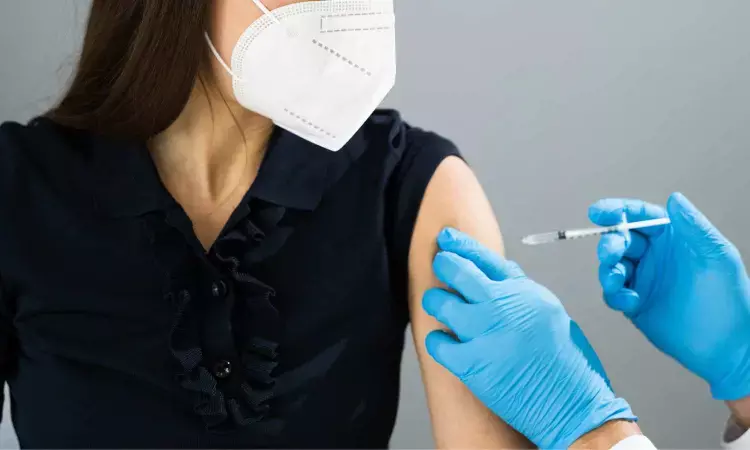- Home
- Medical news & Guidelines
- Anesthesiology
- Cardiology and CTVS
- Critical Care
- Dentistry
- Dermatology
- Diabetes and Endocrinology
- ENT
- Gastroenterology
- Medicine
- Nephrology
- Neurology
- Obstretics-Gynaecology
- Oncology
- Ophthalmology
- Orthopaedics
- Pediatrics-Neonatology
- Psychiatry
- Pulmonology
- Radiology
- Surgery
- Urology
- Laboratory Medicine
- Diet
- Nursing
- Paramedical
- Physiotherapy
- Health news
- Fact Check
- Bone Health Fact Check
- Brain Health Fact Check
- Cancer Related Fact Check
- Child Care Fact Check
- Dental and oral health fact check
- Diabetes and metabolic health fact check
- Diet and Nutrition Fact Check
- Eye and ENT Care Fact Check
- Fitness fact check
- Gut health fact check
- Heart health fact check
- Kidney health fact check
- Medical education fact check
- Men's health fact check
- Respiratory fact check
- Skin and hair care fact check
- Vaccine and Immunization fact check
- Women's health fact check
- AYUSH
- State News
- Andaman and Nicobar Islands
- Andhra Pradesh
- Arunachal Pradesh
- Assam
- Bihar
- Chandigarh
- Chattisgarh
- Dadra and Nagar Haveli
- Daman and Diu
- Delhi
- Goa
- Gujarat
- Haryana
- Himachal Pradesh
- Jammu & Kashmir
- Jharkhand
- Karnataka
- Kerala
- Ladakh
- Lakshadweep
- Madhya Pradesh
- Maharashtra
- Manipur
- Meghalaya
- Mizoram
- Nagaland
- Odisha
- Puducherry
- Punjab
- Rajasthan
- Sikkim
- Tamil Nadu
- Telangana
- Tripura
- Uttar Pradesh
- Uttrakhand
- West Bengal
- Medical Education
- Industry
COVID-19 vaccination does not adversely affect fertility, ovarian health: JAMA

USA: A recent study involving 2,200 women of child-bearing age did not find any link between COVID-19 vaccination and fertility and ovary health.
The findings, published in JAMA Network Open, showed that COVID-19 vaccination is not associated with changes in ovarian reserve by multiple biomarker assays of AMH (anti-Mullerian hormone) and sonographic AFC (antral follicle count), supporting previous studies on AMH.
Ovarian reserve is the ability of the ovary to produce eggs capable of fertilization resulting in a healthy, successful pregnancy. AMH is correlated with the ovarian pool, and AFC is measured during imaging of the ovaries during the menstrual cycle's follicular (egg-development) phase.
For the study, Liubin Yang, Baylor College of Medicine, Houston, Texas, and colleagues retrospectively assessed levels of anti-Mullerian hormone (AMH;974 patients) or sonographic antral follicle count (AFC; 1,222 patients) to evaluate ovarian reserve among women seen at the Texas Children's Family Fertility Center in Houston from January 4, 2016, to December 16, 2021.
The average age of the patients was 34 years. Nine hundred seventy-four women were assessed for AMH, out of which 836 weren't vaccinated against COVID-19, and 138 had received the Moderna (28), Pfizer/BioNTech (87 patients), Johnson & Johnson (9), or an unknown (14) vaccine. The average number of vaccine doses was 2.19, and post-vaccination AMH levels were measured four days to 1 year after receipt of the first dose.
The unvaccinated group was younger and had a lower average concentration of AMH but comparable median BMI (body mass index) and haemoglobin A1c (HbA1c, a marker of blood glucose) levels.
The authors reported the following findings:
· The AMH assay type significantly differed among vaccinated patients relative to the prevaccination group (31%) and the vaccinated cohort (99%) with the current assay.
· A linear regression model suggested that only age and AMH test type—not vaccination status—were tied to AMH value. 18% of patients showed no change in average AMH concentrations measured before and after COVID-19 vaccination.
· The median AFC value was 18 in the unvaccinated group and 20 in the postvaccination group. A linear regression model suggested that age and age-adjusted BMI—not vaccination status—were correlated with AFC level.
· A subgroup analysis of the vaccinated group adjusted for age, BMI, and HbA1c level showed that COVID-19 vaccination was tied to a higher AMH concentration (median, 3.3 vs 4.2 nanograms per millilitre), but the difference was not clinically significant.
"These findings suggest that COVID-19 vaccination is not associated with changes in ovarian reserve by multiple biomarker assays of AFC and AMH, supporting previous studies on AMH," the authors concluded. "On subgroup analysis, the AMH difference was not clinically significant."
Limitations of the study include the factors associated with an ovarian reserve that was not included in the study, the small number of patients who received a vaccination, and survival bias, as only patients who pursued fertility treatment were included. The authors also failed to capture outcomes among those who did not seek treatment.
Reference:
Yang L, Neal S, Lee T, Chou A, Schutt AK, Gibbons W. Comparison of Female Ovarian Reserve Before vs After COVID-19 Vaccination. JAMA Netw Open. 2023;6(6):e2318804. doi:10.1001/jamanetworkopen.2023.18804
Dr Kamal Kant Kohli-MBBS, DTCD- a chest specialist with more than 30 years of practice and a flair for writing clinical articles, Dr Kamal Kant Kohli joined Medical Dialogues as a Chief Editor of Medical News. Besides writing articles, as an editor, he proofreads and verifies all the medical content published on Medical Dialogues including those coming from journals, studies,medical conferences,guidelines etc. Email: drkohli@medicaldialogues.in. Contact no. 011-43720751


